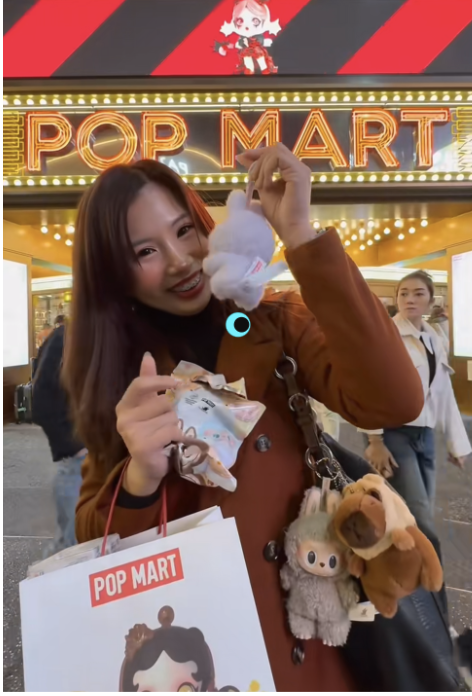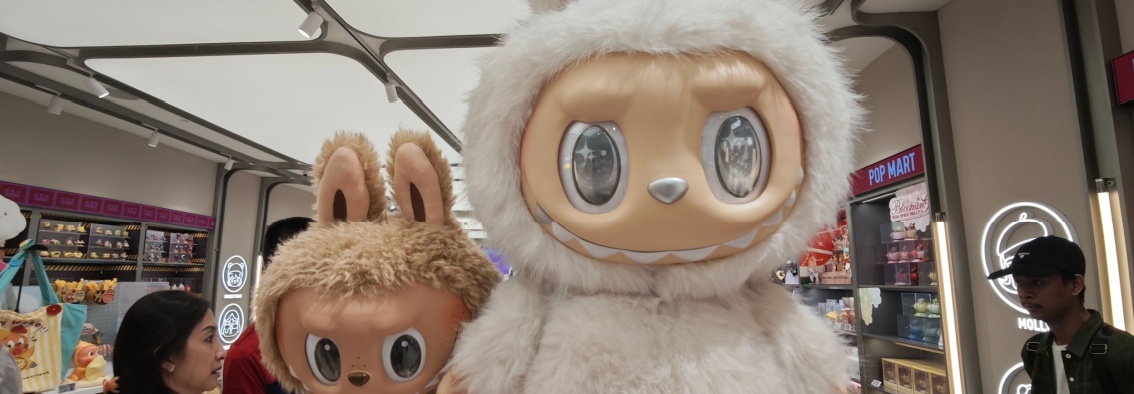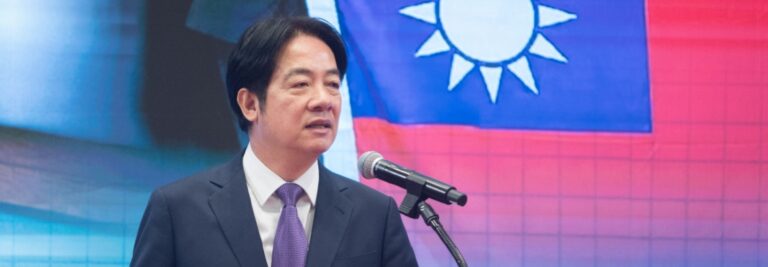Fans will say the dolls are “ugly cute” while their critics will dismiss them as scary.
But whether you love them or hate them, it’s undeniable that Pop Mart’s “The Monsters” plushies, aka “Labubu” (拉布布) dolls, have become a viral part of global commerce—with some referring to the dolls as “recession indicators,” and others as a “mascot of the moment.” Even in Taiwan, where Chinese-made goods are not always publicly embraced, Labubus are hot and their popularity likely surpasses even that of “Chiikawa,” currently one of Japan’s most popular mascots.
Taiwan’s love affair with the doll can be traced back to its very public embrace by K-pop star Lisa, of the music group Blackpink, who declared her love for Labubu dolls on social media and has been seen in public with different versions of the doll ever since. Labubu is an iteration of a character created by Hong Kong artist Kasing Lung (龍家昇). While the character is licensed and sold by Pop Mart, it is incredibly difficult to find through the chain’s official retail outlets. As in many parts of the world, Labubus in Taiwan are most often purchased through resellers—both online as well as through brick and mortar stores—who often charge huge premiums for the doll and its most popular iterations.
Pop Mart Pops Off
The appeal of Pop Mart’s range of characters, which includes popular, licensed Disney characters as well as proprietary creations, rests on their collectability. Most of its collectibles—including its Labubu line—are sold in uniformly-packaged blind boxes, so all a buyer knows is that they’re picking up an item from a particular series. When a buyer opens the box to discover its contents, there is first suspense, anxiety, and then either elation or disappointment. For those who have scored the boxes at Pop Mart, the dopamine hit is real.
Blind boxes aren’t unique to Pop Mart. In fact, they’ve been around for a while, particularly in places like Taiwan, which is in sync with Japanese culture and where blind boxes, seasonal mystery bags full of unknown items, and gashapon—Japanese-style vending machines that drop collectible toys—have been a thing for decades. But there is a certain je ne sais quoi to Pop Mart’s blind boxes—and that unknown quantity has propelled Pop Mart’s growth from a Chinese company to a global retail giant.
Pop Mart’s rise has become the stuff of business legend. It was founded in 2010 when “Grant” Wang Ning (王寧), opened his first concept store in Beijing. While the store had originally been set up to market hip and trendy goods, it found success in 2015 by offering up its first collectible, high-demand product: the Japanese Sonny Angel. That success led to Pop Mart’s transformation from retailer to toy store and in 2020, it listed on the Hong Kong Stock Exchange with a market capitalization of USD 7 billion. The stock ended its first trading day with 80 percent increase in value, with a market cap of USD 12.5 billion. Today Pop Mart operates more than 500 stores globally, and has been listed by Time Magazine as one of the most influential companies of 2025—the same ranking that features Taiwan Semiconductor Manufacturing Company (TSMC, 台灣積體電路製造股份有限公司).

Image: A social media poster shows off a newly purchased Labubu doll in front of a Pop Mart store in Taiwan. (Image source: TikTok)
Breaking Out of the Box in Taiwan
But here in Taiwan at least, Pop Mart’s road to success looks a bit different, thanks to stringent rules governing relations between Taiwan and the People’s Republic of China (PRC). The Regulations Governing Permissions for Trade Between the Taiwan Area and Mainland Area (兩岸貿易許可辦法), as enforced by the Mainland Affairs Council (大陸委員會), list 13 categories of goods and items from China that are banned in Taiwan: including antiques and cultural works, sample products for the “exclusive use of research and development,” animals, Chinese medicines, raw materials meant for reprocessing and re-export, as well as audio-visual materials including movies and television shows. PRC business entities looking to operate in Taiwan are required to register with a specific government body. For instance, PRC securities or investment firms need to consult with the Financial Supervisory Commission (金融監督管理委員會) for licensing and approval.
More wide-reaching regulations governing the operation of Mainland Chinese companies in Taiwan come under the Act Governing Relations between the People of the Taiwan Area and the Mainland Area (臺灣地區與大陸地區人民關係條例), the 1992 legal framework that covers all aspects of relations between the people of the PRC and Taiwan. The all-encompassing Act covers everything from immigration and cultural ties to investment and trade. Given this legislation, the PRC’s largest companies have generally opted to operate in Taiwan through a subsidiary, which is how brands like Xiaomi and Lenovo—both of which are publicly listed on the Hong Kong Stock Exchange—have entered Taiwan.
Like Xiaomi and Lenovo, Pop Mart doesn’t hide its Chinese roots. The company is headquartered in Beijing, domiciled in the Cayman Islands, and listed on the Hong Kong Stock Exchange. Pop Mart Taiwan currently operates at least 12 stand-alone stores. Pop Mart Taiwan distributes some of its goods through a handful of popular, brick-and-mortar resellers, and as of September, 2025, it operates 13 standalone vending machines, also known as “Roboshops” (機器人商店). Pop Mart’s official inventory can also be purchased online through Taiwan’s most popular e-commerce retailers Momo and PCHome, with Momo designated as its “flagship” online marketplace. Unlike other markets such as Hong Kong or the United States, Pop Mart’s toys cannot be purchased directly from its online website, although sources from the e-commerce industry have told this author that the absence of a Pop Mart-branded retail channel is not related to political considerations.
All this is made possible through a joint venture Pop Mart has undertaken with a veteran Taiwan retailer, which remains unnamed (but whose arrangement is reflected in Pop Mart Taiwan’s annual report). According to the document, 60 percent of ownership interest is held by the PRC-based Pop Mart, and 40 percent is held by the local partner. Pop Mart Taiwan stands out as one of the few entities that Pop Mart HQ operates as a joint venture or subsidiary. Pop Mart’s annual shareholder report shows it holds 50 percent equity in its Singapore subsidiary, in Japan it holds 60 percent, and in Hong Kong it holds 25 percent.
In its 2024 annual report, Pop Mart reported combined earnings of RMB 3 billion (around USD 430 million) from its Hong Kong, Taiwan, and Macao stores—representing 10.1 percent of its overall revenue. In the same report, Pop Mart stated that revenue from “East Asia and Hong Kong, Macao and Taiwan regions” increased by 185 percent from 2023 to 2024, illustrating the rapid rise in demand among the PRC’s neighbors.
Spot the Difference
While Pop Mart Taiwan appears to be pulling its financial weight, it’s unclear how much of its revenue is lost to Taiwan-based resellers of counterfeit versions of the popular Labubus, affectionately termed “Lafufus.” Even though Taiwan has strict intellectual property laws banning the sale of counterfeit goods, an unknown number still manage to make it through. In the first half of 2025, the Ministry of Finance’s Customs Administration (財政部關務署) seized over 30,000 counterfeit items with a total value of NTD 470 million (USD 14.3 million). Most were said to be “pharmaceuticals, mobile devices, and household items”—with a majority of the packages coming from China and Hong Kong. The Ministry of Finance did not specify whether any counterfeit “Lafufus” were among the confiscated items, but given the high demand and scarce supply of the dolls in Taiwan, it’s almost a given that more than a few counterfeits crossed the Strait.
Taiwan and China may not currently see eye-to-eye on most issues. But at least the people on both sides of the Strait agree on one thing: Labubus are cute, not ugly—or, at least, an endearing combination of both.
The main point: The popular craze for “Labubu” dolls in Taiwan shows the impact of social media trends in Taiwan’s retail sector – but also provides a case study of continuing trends in cross-Strait retail trade, as well as the attendant issues (e-commerce, counterfeiting, etc.) that affect this trade.




